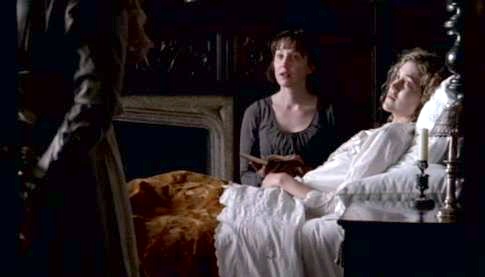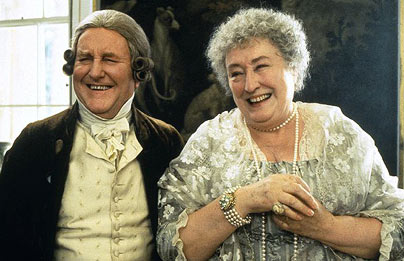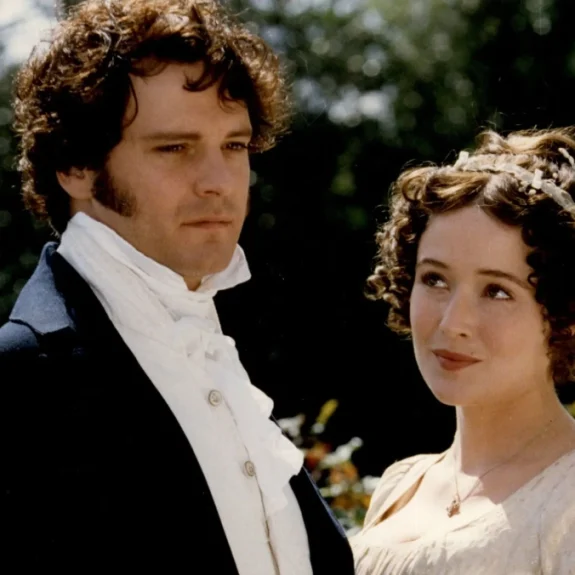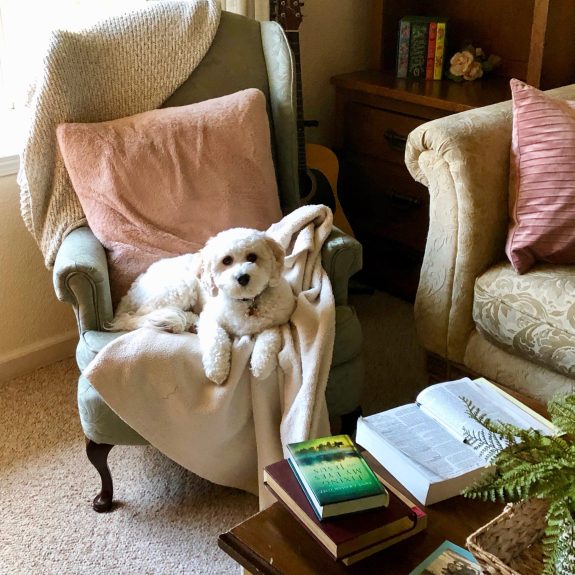In my article in Jane Austen’s World this month, I take a close look at the people who take care of Marianne Dashwood when she’s ill. If you’re looking for a heart-warming story this season, Jane Austen never disappoints. Enjoy!
“Look with compassion upon the afflicted of every condition, assuage the pangs of disease, comfort the broken in spirit.” —Jane Austen, Prayers
This time of year—especially during 2020—many people are in need of comfort and compassion. I find it particularly touching that Jane Austen’s own timeless novels and prayers provide messages of hope that never seem to fade or wear out.
When Marianne Dashwood falls ill in Sense and Sensibility, she is “afflicted” in both body and heart. She doesn’t just need the physical “pangs of disease” assuaged; she needs comfort for her broken spirit. Sick at heart, she also lies sick in bed. It is during these difficult days that we see family members and friends coming to her aid to provide the love and care she needs.
First, Elinor spends her days “attending and nursing” Marianne and “carefully administering the cordials prescribed” (ch. 43). When Marianne worsens on the evening of the third day, Elinor notices her altered condition and stays with Marianne while Mrs. Jennings goes to bed, “knowing nothing of any change in the patient.” Anxious to see Marianne rest quietly, she resolves “to sit with her” as she sleeps. When Marianne’s pulse becomes “lower and quicker than ever,” and she suffers hours of “sleepless pain and delirium,” Elinor anxiously calls for the apothecary, sends Colonel Brandon for her mother, and never leaves her bedside.
This example of sisterly love is similar to the type of care Jane and Cassandra Austen provided for their own family members when they were unwell. When their brother Henry became suddenly and severely ill during one of Jane’s visits to him in London, Jane and Cassandra both helped to nurse him. Caroline Austen provides this detail in her memoir, My Aunt Jane: “Aunt Cass. stayed on nearly a month, and Aunt Jane remained some weeks longer, to nurse the convalescent.” And when Jane herself fell ill, Cassandra, along with Mrs. Mary Austen (née Lloyd), to “take a share in the necessary attendance,” went with her and cared for her in Winchester.
Even once Marianne begins to improve, Elinor stays by her side, “with little intermission . . . calming every fear, satisfying every inquiry of her enfeebled spirits, supplying every succour, and watching almost every look and every breath” (ch. 43). It is only when Elinor is absolutely sure that Marianne is peaceful and sleeping soundly that she can “silence every doubt” and finally quit her post.
Mrs. Jennings, “with a kindness of heart which made Elinor really love her,” also provides as much comfort and practical help as she can during Marianne’s illness: She sends for the Palmers’ apothecary and endeavors, “by her own attentive care, to supply to her the place of the mother she had taken her from.” Elinor quickly finds Mrs. Jennings “on every occasion a most willing and active helpmate, desirous to share in all her fatigues, and often by her better experience in nursing, of material use.”
The morning after Marianne’s long, difficult night, Mrs. Jennings greets Elinor “[w]ith strong concern, and with many reproaches for not being called to their aid.” Austen tells us “[h]er heart was really grieved.” She is “struck” with concern for Marianne’s life, one who “had been for three months her companion, was still under her care, and . . . was known to have been greatly injured, and long unhappy.” She imagines the “distress” Elinor feels and is awakened to the fact that Marianne must be to Mrs. Dashwood what her own daughter Charlotte is to her: and “her sympathy in HER sufferings was very sincere.”
Finally, Colonel Brandon helps the Dashwood family by staying close at all times and volunteering to bring Mrs. Dashwood to town when Marianne becomes delirious and asks for her mother. When Elinor goes downstairs to the drawing room to ask his advice, “her difficulties were instantly obviated, for with a readiness that seemed to speak the occasion, and the service pre-arranged in his mind, he offered himself as the messenger who should fetch Mrs. Dashwood.”
The entire Dashwood family is greatly relieved by Colonel Brandon’s help:
“The comfort of such a friend at that moment as Colonel Brandon—or such a companion for her mother,—how gratefully was it felt!—a companion whose judgment would guide, whose attendance must relieve, and whose friendship might soothe her!—as far as the shock of such a summons COULD be lessened to her, his presence, his manners, his assistance, would lessen it.”
Sense and Sensibility, Jane Austen
Again, during Marianne’s recovery, Colonel Brandon is never far away. He stays in town, visits often, and only returns home when Marianne is well enough to travel back to Barton Cottage with her family.
True to Jane Austen’s style, this portion of the novel also provides us with a message of hope. It’s not just that Marianne’s health improves; it’s also the idea that the long night of anxious waiting doesn’t last forever. That dark hour for Elinor and Marianne does pass. A new day dawns, their mother arrives, and Marianne heals in body and in spirit. Back at Barton Cottage, she once again finds great delight in music and books, walks and nature. And she is eventually able to move forward, finding a deeper, truer love in her marriage to Colonel Brandon than she previously thought possible.
As we enter into this holiday season, perhaps we can find inspiration and hope in the example set by Austen and her characters. Though things look a lot different this year for many of us, we can still provide comfort and compassion in a variety of creative ways. Like Elinor, we can check in and keep careful watch over those who are vulnerable or lonely. Like Mrs. Jennings, we can sympathize and provide for others with genuine concern and generosity. Or, like Colonel Brandon, we can anticipate needs and jump in to help wherever we’re needed.
This year more than ever, we have the opportunity to help those around us, provide care where needed, and extend small kindnesses. We can write, we can call, and we can meet online. We can send gifts and treats and little surprises. And we can share with others those things which give us the most comfort—whether it be a handwritten card, a prayer, a poem, a verse, a piece of music, a handmade gift, or a copy of one of Austen’s beautiful novels.
Gift Ideas for Kindred Spirits
If you’d like to purchase a signed copy of The Anne of Green Gables Devotional or Praying with Jane, a prayer journal, or signed book plates for someone special, please visit my online Gift Shop!













Brenda Cox
December 19, 2020 at 8:39 amLovely, Rachel. A great example of caring and comfort.